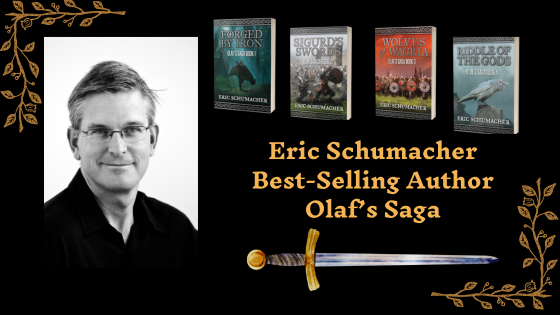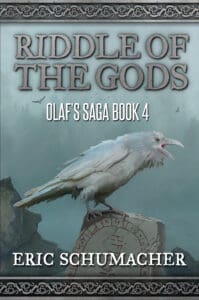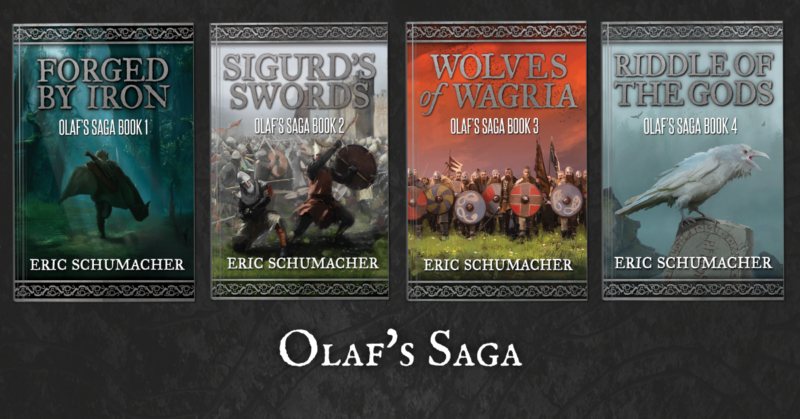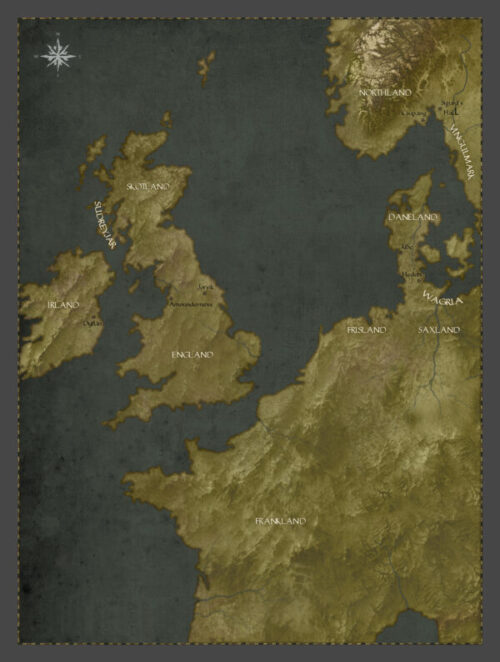
28 Jul Author Interview Eric Schumacher Riddle of the Gods #NorseHistoricalFiction #HistoricalAdventure #BookReview #Vikings @DarkAgeScribe
FEATURED AUTHOR: ERIC SCHUMACHER
It’s my pleasure to welcome Eric Schumacher, best-selling author of the Olaf’s Saga series. I became acquainted with Eric’s work when I voluntarily reviewed his novel, War King (Hakon’s Saga Book 3), for the Historical Novel Society in 2018. Ever since then, I’ve been an avid follower of Eric Schumacher and have read every book in his most recent series, Olaf’s Saga. What makes his stories rise above others in the Viking Age are the engaging characters and vivid details of the Norse culture.
Eric graciously accepted my invitation to interview him after I read and reviewed his most recent Norse Historical Fiction / Historical Adventure novel, Riddle of the Gods (Olaf’s Saga Book 4) that was released by Bodn Books on March 25th, 2024 (280 pages)
Below are highlights of Riddle of the Gods, Eric Schumacher’s author bio, his interview, and my 5-star review of his compelling novel.
HIGHLIGHTS: RIDDLE OF THE GODS

Riddle of the Gods
(Olaf’s Saga Book 4)
By Eric Schumacher
Blurb:
Riddle of the Gods is the riveting fourth novel in the best-selling series chronicling the life and adventures of one of Norway’s most controversial kings, Olaf Tryggvason.
It is AD 976. Olaf Tryggvason, the renegade prince of Norway, has lost his beloved wife to a tragedy that turns the lords of the land he rules against him. With his family gone and his future uncertain, Olaf leaves his realm and embarks on a decades-long quest to discover his course in life. Though his journey brings him power and wealth, it is not until he encounters the strange man in the streets of Dublin that his path to fame unfolds. And in that moment, he is forced to make a choice as the gods look on – a choice that could, at worst, destroy him and at best, ensure his name lives on forever.
Buy Links:
This book is available on #KindleUnlimited.
Universal Buy Link: https://mybook.to/Riddleofthegods
OLAF’S SAGA

Olaf’s Saga is available on Kindle Unlimited
Amazon Buy Link for Olaf’s Saga: https://mybook.to/olafssaga
AUTHOR BIO: ERIC SCHUMACHER

Eric Schumacher is a historical fiction author of multiple best-selling novels set in the Viking Age. From a young age, Schumacher was drawn to books about medieval kings and warlords and was fascinated by their stories and the turbulent times in which they lived. It is a fascination that led to the publication of his first novel, God’s Hammer, in 2005, and many subsequent novels thereafter.
Schumacher now resides in Santa Barbara, CA with his wife and two children and is busy working on his next novel.
Social links:
Website: www.ericschumacher.net
Twitter: https://twitter.com/DarkAgeScribe
Facebook: https://www.facebook.com/EricSchumacherAuthor
Book Bub: https://www.bookbub.com/profile/eric-schumacher
Amazon Author Page: https://author.to/EricSchumacher
Goodreads: https://www.goodreads.com/author/show/399517.Eric_Schumacher
AUTHOR INTERVIEW: ERIC SCHUMACHER

1. Can you tell something about yourself and how you became an author?
I was born in Los Angeles in 1968, and while I consider myself to be a “Southern Californian” who was raised near (and could never live too far from) the sea, I also love to travel, love history, and love stories. My writing, I suppose, is an amalgamation of all of those things.
I’ve been a writer since elementary school. I was drawn to assignments that required writing rather than memorizing names, dates, and formulas. As early as the third grade, I’d come home from school to write my own stories. Strangely, though, I never considered writing as a “career.” It wasn’t until I was in graduate school for business (and studying for a horrible economics test) that the thought of writing as a profession occurred to me. That very day, I went home and started writing what was to become God’s Hammer, my very first book. The rest, as they say, is history.
2. Would you provide an overview of each novel in Olaf’s Saga.
At its core, Olaf’s Saga tells the battle-torn and gut-wrenching story of Olaf Tryggvason’s birth, trials, and rise to the throne of his native Norway. It is also the story of two close friends – Olaf and Torgil – who grow into something more like brothers through their shared adventures. The first book, Forged by Iron, sees Olaf and Torgil survive the brutality of slavery after being driven from their homeland. In the second book, Sigurd’s Swords, the two friends grow into men on the battle-scarred fields of Kyivan Rus’ (now Belarus, Ukraine, and Russia) as the kingdom’s leader, Sviatoslav, seeks to expand his power and his wealth. When Sviatoslav’s favor of Olaf fades, the young veteran leaves Rus’ in Wolves of Wagria, and with Torgil by his side, seeks his fame on the battlefields of a small Slavic kingdom known as Wagria (now Hostein in Germany). Olaf’s wife dies in Ridde of the Gods, and Olaf turns to raiding to salve his sorrow. That is, until a chance encounter with a priest in Ireland shows him his path to fame. While the path proves fruitful for Olaf, it is a path Torgil cannot follow, setting the stage for the final book in the series.
3. What inspired you to write about the legendary King Olaf Tryggvason in the Olaf’s Saga series?
King Olaf Tyrgvvason is a fascinating character. Many of the ancient texts paint him not only as a larger-than-life Viking but as a Christian hero. More modern historians (and countrymen) tend to view him as a villain and traitor. That is to say, he is complicated, tainted, imperfect, and yet somehow, charismatic. It was that complexity that drew me to him originally and that still fascinates me today. His history raised questions I yearned to answer. Was he always a villain or did he morph into that? If his wickedness grew, how did it grow, when did it grow, and why?
The other aspect that drew me to Olaf’s story was the vast ground Olaf covered in his life. He spent time in most of the known Viking world and his life would allow me to investigate and write about those places. I’ve loved diving into each of those settings as a backdrop to Olaf’s life.
4. Why did you choose to tell King Olaf’s story from the perspective of his loyal companion and protector, Torgil? Was Torgil mentioned in the Norse sagas along with Olaf?
Given the complexity of his character, I saw the dangers of writing the story from Olaf’s perspective. He would, of course, see himself as a hero, which I felt would be too one-sided and would not offer the chance to tell a fuller story. I wanted to draw out his complexity. Hence, I chose to write his story from the perspective of his friend, Torgil – someone who was capable of seeing both the good and the bad in Olaf. Torgil is mentioned briefly in Olaf’s original saga as being with Olaf when he and his mother escaped Norway, but he is not mentioned thereafter. Still, if he did exist, and did accompany Olaf on his many adventures, who better to have as the biographer of Olaf’s life?
5. How important is it to have your facts right and are there any instances when you bend history to fit your story?
It is important to me to get the facts as correct as I can. I want the history to be believable, and for people who know the history to find as much satisfaction in my story as those who don’t know the history. For that reason, I spend a lot of time researching and doing my best to get things right.
That said, much of Olaf’s history was recorded decades, and even centuries, after his existence, and is therefore not entirely reliable. Given that, I do my best to piece together the known history of the time and rely on plausibility for the rest. I ask myself questions such as, Could something have happened? Is it believable? Would it make sense for the time?
A good example of this can be found in Wolves of Wagria. There has been much debate as to Olaf’s location after he leaves Gardariki. The general understanding is that he served in the royal court of what is today Poland. But for many reasons, Poland made little sense. As this was central to the setting of the book and the plot, I scoured historical sources for more information. I eventually found a research article that offered a different – and very plausible – location for Olaf that made more sense historically and to my book. The research article has not been proven as true, but it worked for the story, so I used it.
6. What is your favorite quote from one of your books in the Olaf’s Saga series?
“Oaths are like iron, Torgil. You cannot break them.”
So says Torgil’s father to Torgil in the very first book. It is this idea that is the foundation of the entire series.
7. Can you give novice writers some tips (do’s/don’ts)?
Keep writing and don’t stop. Even when you think your words are garbage, don’t stop. Even when you spend hours staring at a blank screen and you only get a few words written, come back the next day and try again. The more you write, and the longer you write, the better you’ll get. And remember, even seasoned writers have bad days.
It may seem obvious, but put your best book forward. Your book is your product and is a reflection of your talent, so make sure the story and the grammar are thoroughly edited. Have readers beyond friends and family read it and provide feedback. I also send my book to readers who know Viking history. Having their historical feedback has been invaluable.
Ask for help. My experience has been that writers are always willing to help fellow writers. So if you need direction, or have a question, don’t be afraid to reach out and ask.
8. What are your future plans as an author?
My immediate plan is to finish book five of the saga, which will also put an end to the saga. It’s an end I look forward to and also fear because, quite frankly, I don’t know what is next. I may have more Viking tales in my future, but I’m also yearning to tell the history of different places, times, and peoples. So we’ll see!
BOOK REVIEW: RIDDLE OF THE GODS
 Riddle of the Gods: A Viking Age Novel by Eric Schumacher
Riddle of the Gods: A Viking Age Novel by Eric Schumacher
My rating: 5 of 5 stars
The clash between Christian religion and the Norse pagan beliefs adds another layer of conflict in the epic Norse adventure and action Riddle of the Gods—the fourth book in the Olaf’s Saga series. The Viking-age series is based on the legendary Olaf Tryggvason, King of Norway. The story is told from the first-person perspective of Torgil, Olaf’s companion. In the previous three books of the series, Torgil has sacrificed almost everything to fulfill his vow to protect his king.
The tale continues in 976 A.D. when Olaf tragically loses his pregnant wife, Queen Geira, in Wagria and nobles turn against him. Torgil follows Olaf on his decades-long quest to seek fortune and fame elsewhere. Olaf’s destiny dramatically changes when he encounters a disheveled priest in the streets of Dublin who declares: “Unlike the others who have come before you, you will become a renowned king and do celebrated deeds. Many men will you bring to the new faith through baptism … but before you possess those riches, you will be wounded almost to death by your own men and carried upon a shield to safety.” The prophecy comes true. Olaf miraculously heals in seven days from his wounds and converts to Christianity. He demands the same conversion from his warriors. Torgil, a strong believer in the Norse pagan gods, risks losing Olaf’s patronage if he doesn’t adopt the Christian religion.
Author Eric Schumacher has masterfully woven another conflict into the Viking saga: Christian dogma challenging traditional Nordic beliefs. The riveting battle scenes vividly play out in your mind like the previous books in the series. Yet, Torgil’s internal struggle to choose between his core values and duty to his king is as heart-wrenching as the combats. To truly understand the essence of Olaf and Torgil up to this point, I suggest you read the previous books in the series that explore universal themes of political corruption, love vs. duty, betrayal, and friendship. The books in Olaf’s Saga capture the turmoil of the Viking culture collapsing under the threats of warfare, Christian religion, and internal divisions. It is an addictive series akin to Bernard Cromwell’s The Last Kingdom, conveying the rise of kings and nations during the medieval period. Extra bonuses in the books include regional maps and a glossary of Viking terms used in the narrative.
Riddle of the Gods continues the epic saga of King Olaf and his closest companions searching for their destinies in the brutal Middle Ages world steeped with warfare, political intrigue, and betrayal. I highly recommend this multi-layered Norse adventure and action for its memorable characters, riveting battle scenes, and thought-provoking themes that will resonate in your mind long after you have finished reading the book.


No Comments